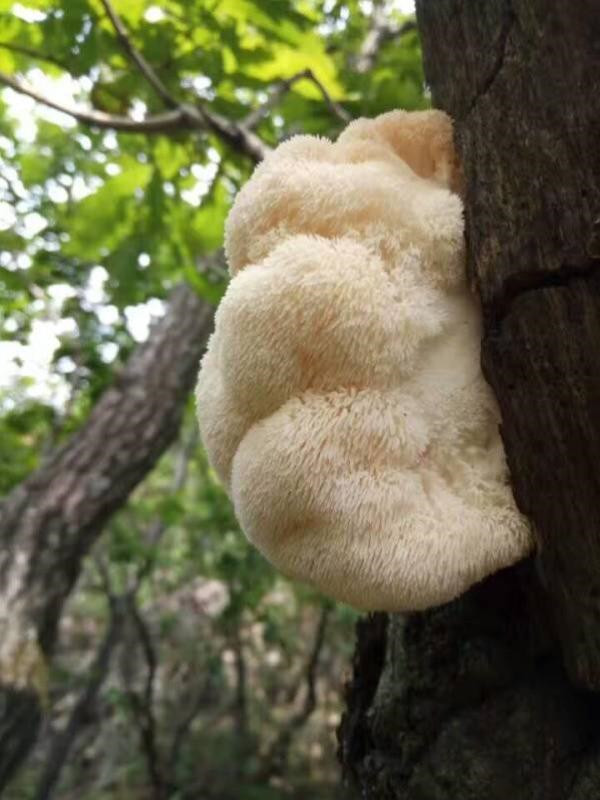Lion’s Mane mushroom, with names like Hericium erinaceus, Monkey’s Mushroom, Bear’s Head, Hog’s Head Fungus, WhiteBeard, Old Man’s Beard and Bearded Tooth, It’s called Yamabushitake in Japan. The mushroom is a delicious mushroom that belongs to the tooth fungus family, its long spines and dark orange-red cap make it easy to spot. It tends to grow in clusters and grow on hardwood trees.
Studies have shown that hericium fruit-body contains a large number of polysaccharides, mainly α -glucan, β -glucan and glucan-protein complex, which can prevent, relieve or treat cancer, gastric ulcer, diabetes, hyperlipidemia, liver injury and neurodegenerative diseases. Therefore, hericium ordosica polysaccharide is a potential bioactive ingredient for drug preparation development in the future. This paper comprehensively summarizes the extraction and pharmacological effects of polysaccharides extracted from Hericium hericium here.
Extraction and purification of Hericium polysaccharide
The methods of isolating and purifying polysaccharides from Hericium hericium are microwave radiation, supercritical CO2 extraction, enzyme extraction and so on. The procedure can be summarized as follows: the total fruited body or mycelium of hericium orbicularis is pre-extracted with ethanol under reflux to remove lipids, the remaining residues are dried and extracted with hot water, and the polysaccharide solution is collected after filtration and concentration. Crude polysaccharides were obtained by ethanol precipitation, and then dissolved in water, insoluble residues were removed by centrifugation. The supernatant was applied to different column chromatography including anion exchange chromatography and gel permeability chromatography to obtain purified polysaccharides.
Benefits of Hericium polysaccharide
The pharmacological activities of hericium polysaccharide mainly include: anti-cancer, improving immunity, protecting intestinal mucosa, anti-oxidation and liver, neuro protection, lowering blood lipid and blood sugar, improving memory, anti-fatigue and anti-aging, etc
The Lions Mane mushroom has been studied for its potential as a cognitive enhancer. Researchers have found that mice with Alzheimer’s disease and Parkinson’s disease benefited from dietary supplements that contained lion’s mane. In addition to improving cognitive function, Hericium polysaccharide has anti-inflammatory and antioxidant properties that may make it a natural treatment for these diseases. More research is needed to confirm these findings in humans.
In mice, the lion’s mane mushroom has shown promise in enhancing the growth of neurons. The mushroom is also believed to help regenerate cells damaged by peripheral nerve injuries, which affect delicate tissue in between the brain and spinal cord. This type of study is ongoing, but it is a promising start.
Another important study of the Hericium polysaccharide found that it can reduce cholesterol oxidation. This oxidized form of cholesterol attaches itself to artery walls, increasing the risk of a heart attack. It also reduced blood clotting and helped reduce the risks of heart attacks in mice. The study concluded that the lion’s mane has no significant toxicity. This is encouraging news for those suffering from neurological conditions, though further research is needed to confirm these findings.
Several studies have shown that the Hericium polysaccharide has the potential to fight cancer cells. One recent study showed that supplementing mice with lions mane extract decreased the symptoms of depression and anxiety. The findings support the widespread use of lions mane as a brain enhancer.
Moreover, a study in 2015 has found that Hericium polysaccharide has antioxidant activity, which means that it can be beneficial for those who suffer from brain or nerve diseases. Now the mushroom is often found in many different types of foods and beverages, and it is a good source of healthy fats. The nutritional content of lion’s mane mushroom is also beneficial for the human body.
- Dandelion Extract: What It Is, Benefits, Uses and Side Effect - April 23, 2024
- Is Berberine Extract Help For Weight Loss? - April 11, 2024
- Why Is Pysllium Husk Powder A Popular Meal Replacement Ingredient? - April 3, 2024



